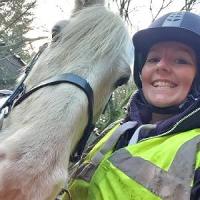What matters? Is a change in how we provide care needed?
This is article twenty-three in an RCVS Knowledge series of features on patient safety, clinical human factors, and the principles and associated themes of Quality Improvement (QI).
Scenario
It’s a Tuesday morning after the August bank holiday and Ben, your new veterinary graduate has just seen a long-standing client, Mrs Maladi and Mr Tiddles her cat. He has come to ask about the nurse's availability to explain to Mrs Maladi how to begin diabetic treatment. Ben is really enthusiastic and wants to get all of this right as this is his first diabetic case.
Ben seems a little deflated after your discussion. He was convinced that Mrs Maladi would be fine with this treatment but appreciates the challenges you have mentioned. Mr Tiddles isn’t going home until the afternoon, which gives you a little more time to assess the case with Ben. You remember reading about a conversation guide for discussing contextualised care on the RCVS Knowledge website, and suggest to Ben that this might be helpful when planning Mr Tiddles’ care.
Contextualised care
As discussed in the previous article in this series, contextualised care is an approach to cases which takes into consideration other factors, including those of the animal’s surroundings1 and caregiver/owner input. In Mr Tiddles’ case, when we discuss what is important within the pet/owner relationship, we should expand this to include consideration for Mr Tiddles’ Quality of Life (QOL). Defining this more objectively within the veterinary profession has been gaining momentum over recent years. Quality of Life and Welfare assessment2,3 was the main focus at the British Veterinary Association (BVA) Animal Welfare Foundation discussion forum in 2018. In human medicine, there is a QOL discussion tool, which supports Health-Related Quality of Life (HRQL). Veterinary HRQL assessment4 has proven to be reliable across many chronic pain conditions such as dental disease, orthopaedic pain, and chronic inflammatory diseases.
Health-Related Quality of Life
A deeper understanding of this work within Quality of Life in humans has shown how the outcome of using the tool can change over the course of time. The human healthcare sector has begun to take a patient-centred and shared decision-making approach.
The development of veterinary HRQL approach relies on behavioural observation, normally by the caregiver, such as validated pain scales. It should encourage us to see each animal as an individual in how they are affected by illnesses and interventions, social interactions and changes in living conditions5.
Ben is interested in how this conversation guide could facilitate his consultation with Mrs Maladi; however, he has concerns about what the outcome might be, particularly if it isn’t possible for Mrs Maladi to manage the injections needed. You are concerned that Ben may feel a degree of moral distress while navigating the decision process, especially if euthanasia ends up being the most appropriate option, after weighing up all the associated factors.
Moral Distress
Moral distress has been described across the profession in conjunction with ethical conflict and is linked to well-being. Specific events can sometimes be described as moral hazards in that they may contribute to stress and compassion fatigue6,7.
The ability to have a conversation around a challenging decision is valuable in helping to provide options to improve QOL in a complex situation. Having a clear way to evaluate such cases can help reduce the stress for veterinary teams and facilitate communication with owners. It can help ease the potential for moral distress borne by all parties when a decision regarding euthanasia may be necessary5,8,9,10.
The ‘Conversation Guide for Contextualised Care’, which has been based on the Informal Carer’s Checklist11 is a great way to begin these conversations. It helps to open up a conversation about how the owner feels about the choices available, including the feasibility of certain treatment options, or regimes. There is also a caregiver burden for those who may be impacted by decisions taken around the management and treatment of chronic conditions in patients. Many people adapt their lives to support this10. For some, it is interesting, on reflection, as to how much they see the impact of this on other areas of their lives.
Mrs Maladi arrives at the practice and is guided into the nurse’s room where you sit around the table and introduce the ‘conversation guide’. You and Ben introduce the choices available to Mr Tiddles and during the demonstration, it’s clear that Mrs Maladi will struggle to draw up the insulin needed to treat him, due to her arthritis. She feels that she may be able to help alter his diet as he comes in regularly for his food. When Ben explores how she feels about Mr Tiddles’ ongoing care, it is clear that she doesn’t want him to suffer. She is aware that diabetes is a treatable condition, and that her neighbour also has diabetes and injects themself daily. Mrs Maladi wonders if they might be able to help her with Mr Tiddles. While she would like to try and see what might work, she also understands that if it isn’t possible to treat him that she would prefer to euthanase him rather than see him suffer.
You and Ben have a cup of tea as you finish up the notes at the end of the day, ready for the night team coming in to help manage the inpatients. Ben reflects on how important it has been to talk openly with owners and how much he has learnt from doing this with Mrs Maladi today.
The conversation guide is valuable in helping begin a conversation with owners about the ongoing care of their pet. Having open conversations helps to remove assumptions, and improve communication so that the team can provide better care for challenging decisions. It can help to establish the tone and how we can then apply the various treatment options via the Complex Case Management framework to arrive at a decision.
Checklist: what you can do next
- Download the 'Conversation guide for discussing contextualised care' to help the veterinary team start open conversations about the options available, and to help identify areas of support the care-giver/owner may require when diagnosing and managing complex cases.
- Read the previous article in this series 'Maximising welfare benefits by contextualising case management' to understand how care-givers/owners and the veterinary team work together for the best quality of life for the patient by combining clinical expertise with the most relevant and best available evidence, patient circumstances and care-giver/owner factors.
- While we are used to considering the effect of disease or disability on the quality of life of our patients, we are less used to thinking about the potential effects that caring for an animal with a chronic condition or disability has on their owners. Have a read of the inFOCUS 'In the spotlight' feature, 'Care-giver burden and the client perspective on veterinary care', which brings together published resources exploring the concept of care-giver burden as it relates to the owners of veterinary patients.
- When we ask all members of a team what matters to them, we gain a comprehensive understanding of what lies beneath our combined commitment to the best possible care. Taking the time to ask can be the first step to improving workplace wellbeing for your team, and your clients' and patients' experiences. Join the 'What matters to you' conversation with RCVS Knowledge, in the series of Vet Times articles about improving joy in work. You can download the 'What matters to you - Conversation guide for leaders' to help support veterinary teams introducing the Joy in Work concept to engage and empower the team in continuous Quality Improvement.
- Read Mark Turner's blog, 'Improving Patient Safety: new horizons, new perspectives', where he talks about the 'Stress Management Model,' which helps to highlight an integrated approach to mental health at work.
- Having a structure to help facilitate conversations around the management of complex cases and challenging decisions can help reduce stress for the veterinary team. Vetlife is an independent charity providing free and confidential support to anyone in the UK veterinary community.
References
- Skipper, A. et al. (2021) ‘Gold standard care’ is an unhelpful term. Veterinary Record, 189 (8), pp. 331. https://doi.org/10.1002/vetr.1113
- Honess, P. and Wolfensohn, S. (2010) The extended welfare assessment grid: a matrix for the assessment of welfare and cumulative suffering in experimental animals. Alternatives to Laboratory Animals, 38 (3), pp. 205-212. https://doi.org/10.1177/026119291003800304
- Niessen, S. et al. (2012) Evaluation of a quality-of-life tool for dogs with diabetes mellitus. Journal of Veterinary Internal Medicine, 26 (4), pp. 953-961. https://doi.org/10.1111/j.1939-1676.2012.00947.x
- Reid, J. et al. (2007) Development of the short-form Glasgow Composite Measure Pain Scale (CMPS-SF) and derivation of an analgesic intervention score. Animal Welfare, 16 (S1), pp. 97-104.
- Belshaw, Z. (2018) Quality of life assessment in companion animals: what, why, who, when and how. Companion Animal, 23 (5), pp. 264-268. https://doi.org/10.12968/coan.2018.23.5.264
- Platt, B. et al. (2012) Suicidal behaviour and psychosocial problems in veterinary surgeons: a systematic review. Social Psychiatry and Psychiatric Epidemiology, 47, pp. 223-240. https://doi.org/10.1007/s00127-010-0328-6
- Moses, L., Malowney, M.J. and Wesley Boyd, J. (2018) Ethical conflict and moral distress in veterinary practice: A survey of North American veterinarians. Journal of Veterinary Internal Medicine; 32 (6), pp.2115-2122. https://doi.org/10.1111/jvim.15315
- Belshaw, Z. and Dean, R. (2015) Calling time on survival times? Journal of Small Animal Practice, 56 (11), pp. 635-636. https://doi.org/10.1111/jsap.12413
- Reid, J., Nolan, A. and Scott, M. (2018) When is the right time? Veterinary Record, 182 (3), pp. 85-86. https://doi.org/10.1136/vr.k274
- Belshaw, Z., Dean, R. and Asher, L. (2020) “You can be blind because of loving them so much”: the impact on owners in the United Kingdom of living with a dog with osteoarthritis. BMC Veterinary Research, 16, no. 190. https://doi.org/10.1186/s12917-020-02404-5
- Quality Improvement: Informal carers’ checklist – Newham Community Neurology Team [NHS. East London Foundation Trust] [Online]. Available from: https://qi.elft.nhs.uk/resource/informal-carers-checklist-newham-community-neurology-team/ [Accessed 29 September 2022]
About the Authors
Runa Hanaghan BVSc PgDip SSRM MRCVS
 Runa is a Quality Improvement Advisor for RCVS Knowledge and a member of the Quality Improvement Advisory Board. Runa qualified from Bristol University and has had a variety of experience in general practice, working across the UK and returning to her home country of Ireland where she established a sole-charge small animal clinic in Co. Mayo. This community focused clinic presented opportunities to become involved with teaching vet and nursing students along with her excellent veterinary nursing team, leading to a growing interest in checklists and patient safety.
Runa is a Quality Improvement Advisor for RCVS Knowledge and a member of the Quality Improvement Advisory Board. Runa qualified from Bristol University and has had a variety of experience in general practice, working across the UK and returning to her home country of Ireland where she established a sole-charge small animal clinic in Co. Mayo. This community focused clinic presented opportunities to become involved with teaching vet and nursing students along with her excellent veterinary nursing team, leading to a growing interest in checklists and patient safety.
An opportunity to bring this experience and interest to a wider group was taken in 2010 with her appointment as Clinical Lead at Bristol University, teaching undergraduate vet students at their on-site small animal practice. Her role in this busy environment, with ever-changing personnel as students moved through their placements helped to further Runa’s interest in communication and patient safety.
Runa joined Dogs Trust in late 2011 as Deputy Veterinary Director. This is a hugely varied role and one which stays closely connected to the vet practices working alongside the charity nationwide; as well as the procedures that are managed on site at Dogs Trusts rehoming centres. She also sits as a committee member on the Association of Charity Vets with a strong interest in shelter medicine and shelter metrics.
A post graduate qualification in Social Sciences Research Methods allowed her to explore the role of non-clinical skills with undergraduate teaching in a research project. An active interest in patient safety has developed with a deeper understanding of the areas that make up quality improvement. She is not only passionate about where this influences animal welfare through clinical care, but also the wellbeing of the team delivering it. Within the charity, active internal reporting of near miss clinical incidents has been established since 2017, signposting to the wider profession the tools that are now available to them. Significant event audits have also become routine from a veterinary perspective and have broadened within the charity to include other teams who manage and care for dogs at Dogs Trust, enhancing psychological safety and helping to develop a cultural change with a learning culture.
Helen Silver-MacMahon MSc (Dist) PSCHF Cert VNECC DipAVN(surg) Cert SAN RVN
 Helen is a veterinary nurse and Research and Development Director at VetLed. Having worked in general practice, referral hospitals and nursing education over the past 21 years, she has extensive professional experience and understanding from a wide range of settings.
Helen is a veterinary nurse and Research and Development Director at VetLed. Having worked in general practice, referral hospitals and nursing education over the past 21 years, she has extensive professional experience and understanding from a wide range of settings.
Helen is passionate about developing the veterinary professions understanding of Human Factors as a powerful aid in improving patient safety, enhancing performance and supporting the wellbeing of the veterinary team. She is an RCVS Knowledge Champion for her role in the sustained training and use of a surgical safety checklist within the small animal theatre at the former Animal Health Trust.
In 2021, Helen completed an MSc in Patient Safety and Clinical Human Factors at the University of Edinburgh.
For her dissertation project Helen researched situational awareness in the veterinary operating theatre and has a special interest in non-technical skills. In her role at VetLed she enjoys applying this knowledge to develop and deliver professionally relevant training for all members of the veterinary team.
Amelia Poole BSc(Hons) Dip AVN RVN, Quality Improvement Project Manager
 Amelia is a Registered Veterinary Nurse who previous to RCVS Knowledge, worked in practice for 11 years. She worked at a variety of privately owned hospitals, as well as rescue centres, concentrating on intensive inpatient care.
Amelia is a Registered Veterinary Nurse who previous to RCVS Knowledge, worked in practice for 11 years. She worked at a variety of privately owned hospitals, as well as rescue centres, concentrating on intensive inpatient care.
She has always been passionate about EBVM and Quality Improvement (QI) within practice to offer patients the best possible care and uses her veterinary experience to ensure that content is relevant to those in practice.
Amelia's role within RCVS Knowledge includes managing national audits and registries, such as the National Audit for Small Animal Neutering, the National Audit for Post-operative Outcomes and the Canine Cruciate Registry. This includes working with the Quality Improvement Advisory Board, members of the profession and various working groups to create resources and content that will support practices in embedding QI in practice, and use their audit data to help improve patient care on a practice, local and national scale.
October 2022